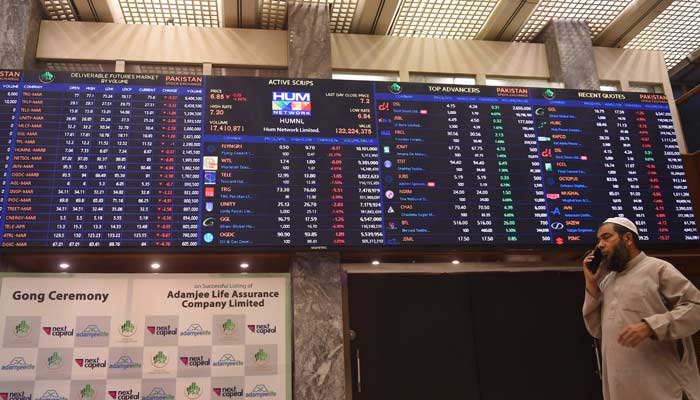PSX weekly review: KSE-100 recoups losses; gains 1.2% in short trading week
March 26, 2022

- Market traded on both sides of the fence in the wake of a combination of positive and negative news flow.
- KSE-100 gains 522 points during the week to settle at 43,551.14 points.
- Foreign selling continued this week, clocking in at $4.12 million.
KARACHI: A shorter trading week at the Pakistan Stock Exchange (PSX) ended on a high note as the benchmark index gained 522 points or 1.2% to settle at 43,551.14 points despite the gloomy political situation in the wake of the no-confidence motion against Prime Minister Imran Khan.
The market traded on both sides of the fence in the wake of a combination of positive and negative news flow during the rollover week that ended on March 2.
This week the market remained sluggish due to domestic political uncertainty and slow progress on the negotiation with the International Monetary Fund (IMF).
Read more: IMF, Pakistan reach deadlock
Although the market gained some momentum amid a 78% month-on-month contraction in the current account during February 2022 coupled with a landmark agreement on the Reko Diq between the federal and Balochistan government, and Barrick Gold Corporation; however, this remained short-lived.
Rising cut off rates in the T-bill auction, signalling monetary tightening, as well as the rupee weakening to its historic low, crossing the Rs181 mark against the US dollar, kept the index range bound.
Read more: Car prices in Pakistan expected to increase by 15%
Other major developments during the week were: the government failed to convince IMF over amnesty scheme, cost of power generation went up 78% in July-February, up to Rs1.2 million price hike shocked Toyota buyers, non-textile exports jumped 26% to almost $8 billion and weekly inflation based on SPI decreased by 1.37% week-on-week.
Meanwhile, foreign selling continued this week, clocking in at $4.12 million against a net sell of $4.90 million recorded last week. Selling was witnessed in banks ($5.9 million), and exploration and production ($0.8 million).
On the domestic front, major buying was reported by mutual funds ($5.3 million), followed by individuals ($2.6 million).
During the week under review, average volumes clocked in at 143.7 million shares (down by 17.4% week-on-week), while average value trade settled at $25.8 million (down by 1.5% week-on-week).
Major gainers and losers of the week
Sector-wise positive contributions came from fertiliser (+160 points), cement (+97 points), power generation and distribution (+57 points), commercial banks (+56 points), and chemical (+47 points). On the flip side, negative contributions came from automobile parts and accessories (-16 points), paper and board (-6.95 points), miscellaneous (-6.29 points), oil and gas exploration (-4.02 points) and insurance (-2.58 points).
Scrip-wise major gainers were HBL (+93 points), Lucky Cement (+84 points), Fauji Fertiliser Company (+72 points), TRG Pakistan (+64 points) and Hubco (+52 points). Meanwhile, major losers were Systems Limited (-42 points), UBL (-41 points), BAHL (-25 points), Thal Limited (-16 points), and Habib Metropolitan Bank (-11 points).
Outlook for next week
A report from AHL predicted: “We expect the market to remain range-bound next week due to political unrest and the upcoming voting on the no-confidence motion.”
“On the international front, any de-escalation in Russia-Ukraine tensions could propel a rebound in markets,” it said, adding that market participants should also remain wary of high commodity prices, any indication of oil prices cooling down would also aid the sentiment in the local bourse.
“The KSE-100 is currently trading at a PER of 4.7x (2022) compared to the Asia-Pacific regional average of 12.4x while offering a dividend yield of 9.2% versus 2.5% offered by the region,” the brokerage house stated.











